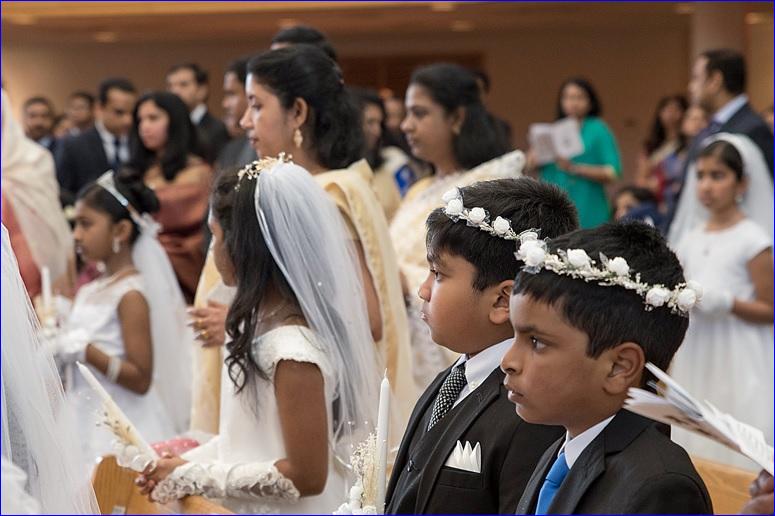


 Zoey Maraist/Catholic Herald)
Zoey Maraist/Catholic Herald)
Seventeen children celebrated their first Holy Communion with Auxiliary Bishop Mar Joy Alappatt of the St. Thomas Syro-Malabar Diocese of Chicago May 26; eight of them also were confirmed. The diocese, which encompasses all of the United States, was established in 2001 and is growing. This year, the diocese will ordain its first priest native to the U.S.
First communicants and their parents processed into the church to present the bishop with a tray of flower petals with prayers and offerings for the church. In their liturgy, the offertory occurs at the beginning of Mass, said Felix Simon, a parishioner and catechist of the community. Also in the Eastern tradition, children are baptized and confirmed at the same time. The children who were baptized in Roman Catholic churches also received the sacrament of confirmation.
During his homily, Bishop Alappatt showed the boys and girls a picture of the day he received his first Communion, which he said was one of the most beautiful and important days in his life. "Don't leave Jesus here in the church," he told them. "Jesus wants to come into your home, to eat with you, to study with you, to play with you. Jesus wants to accompany you."
During the Mass, the children led the congregation in a Syriac hymn and the Our Father. "This is the fourth year in succession that we've had Syriac as sort of a rite of passage," said Simon. Much like Latin in the Western tradition, Syriac was used in their liturgy until the vernacular replaced it in the early 1960s. As part of the Aramaic Project, started by his friend Father Joseph Palackal, Simon and others are trying to keep the ancient tongue alive.
"It was not being used, so that knowledge base is lost," said Simon. "We're trying to reintroduce some of the elements of the Syriac hymns. For the older generation, it's nostalgic."
Though it was hard at first for them to grasp the pronunciation of the words, Simon thought the children sang spectacularly. "The children were excited to learn a new language, especially the language Jesus spoke," he said. "When you say the Our Father it's almost the exact words (of) Jesus."

or register to post a comment.